|
|
|
Sort Order |
|
|
|
Items / Page
|
|
|
|
|
|
|
| Srl | Item |
| 1 |
ID:
174375
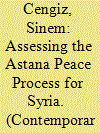

|
|
|
|
|
| Summary/Abstract |
Since 2011, numerous peace initiatives have been initiated out by several actors to end the Syrian civil war in a peaceful way. This article presents the “Astana Peace Process” brokered by Russia, Turkey, and Iran in early 2017 as a case study of a mediation and examines its predecessors to understand the reasons for the failures of those attempts and develops an assessment of the Astana peace process itself. To gain a better understanding of the Astana peace process, this article incorporates the efforts of main actors, their approaches, and the context of the war. In doing so, the article begins by describing the background of the civil war and then uses traditional concepts in mediation theory to elucidate the limitations of the unsuccessful attempts. Next, it investigates how the Astana peace process was different and the driving factors that encouraged the states to engage in this process and argues that Astana peace process’s overall effectiveness is likely to remain limited due to the conflicting interests of the mediators.
|
|
|
|
|
|
|
|
|
|
|
|
|
|
|
|
| 2 |
ID:
174373
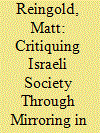

|
|
|
|
|
| Summary/Abstract |
Seven of Israeli cartoonist Asaf Hanuka’s comic strips from his weekly series The Realist make use montage-like elements by juxtaposing distorted mirror images of scenes. While published over the course of Hanuka’s almost 10-year run and addressing radically different topics, the structure and nature of the seven strips is remarkably similar. Each includes the juxtaposition of contrasting ideas to offer a commentary on a different aspect of the Israeli society. These topics include the historical mistreatment of Jewish immigrants to the country, the country’s policies toward foreign workers, and the economic challenges faced by the middle-class Israelis. While Hanuka’s technique provides an opportunity for considering different attitudes toward the topic, these strips consistently take a stance that places blame on Israelis themselves for either their attitudes or their electoral decisions. The comics serve, therefore, as political commentary which through the juxtaposition of images, encourages societal change.
|
|
|
|
|
|
|
|
|
|
|
|
|
|
|
|
| 3 |
ID:
174374
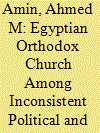

|
|
|
|
|
| Summary/Abstract |
Beginning with the uprising in 2011 and until the reelection of President Abdel Fattah El-Sisi in 2018 for a second term, the Egyptian Orthodox Church has been an important player as the representative of the Coptic Christians in the country. This article examines the role of the Egyptian Orthodox Church since the establishment of the republic in 1952 and explores the historical events that sought to redefine the role of the Church in the political sphere. Unlike the previous studies focusing on Coptic Christians and their position in the sociopolitical contexts, this study tackles the political role of the Orthodox Church in its institutional capacity. The study concludes that the Egyptian Orthodox Church has turned into an important political player in the political sphere, and its political role increased substantially with the uprising. Its power is manifested in its support for the political transformations in 2013 and the backing the regime until today.
|
|
|
|
|
|
|
|
|
|
|
|
|
|
|
|
| 4 |
ID:
174376
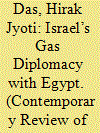

|
|
|
|
|
| Summary/Abstract |
Historically, Israel has been dependent on the imports of oil, coal, and natural gas to meet its energy demands, and energy security is an integral part of its security and foreign policy. In its neighborhood, gas relations with Egypt began in 2008, which was terminated in 2012, thereby propelling Israel to diversify its imports and explore domestic production. The latter inverted the energy balance that transformed Israel from being a buyer, and Egyptian firms have shown interest to open their market for Israeli gas. At the same time, fresh gas discoveries in Egypt have opened up new policy options and challenges for Israel. The research would be exploratory and contextualize the Israel–Egyptian relations through the prism of energy and focus on the potential for Israel’s gas diplomacy and engagement and would evaluate the drawbacks and challenges in its energy policy vis-à-vis Egypt.
|
|
|
|
|
|
|
|
|
|
|
|
|
|
|
|
| 5 |
ID:
174371
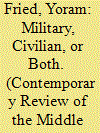

|
|
|
|
|
| Summary/Abstract |
Over the years, attempts to define the notion of national security in terms of what it means and what it represents have ranged from a classical, purely military definition, to a broader multidimensional concept encompassing a range of different features. Studies on Israel’s national security concept have tended to emphasize the formative role played by David Ben-Gurion, Israel’s first prime minister and defense minister. These works have focused on the military aspects of the national security concept, based on arguments concerning the perceived threat of wartime engagements with Arab armies. This article argues that Ben-Gurion’s national security concept was essentially a civilian perspective with military features that responded to the four types of threats, local, regional, international, and Jewish, facing the State of Israel at the time, most of which were not military.
|
|
|
|
|
|
|
|
|
|
|
|
|
|
|
|
| 6 |
ID:
174372
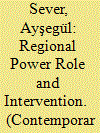

|
|
|
|
|
| Summary/Abstract |
The article elaborates how Turkey’s relations with Syria, which have been pursued by varying foreign policy instruments and conduct, have greatly affected Turkey’s standing on the Middle East during the 2000s. By employing the relevant concepts, “regional power” and “third party intervention” in the literature, the article aims to explain the changes caused by the Syrian conflict in the AKP’s (Adalet ve Kalkınma Partisi—the Justice and Development Party) foreign policy in a better frame. After the Syrian conflict, Turkey’s increasing intervention in Syria including use of force resulted in a new power projection other than soft power in its regional relations. Neighboring a civil war state caused Ankara to organize its relations with Syria and the Middle East in a new context which requires new mechanisms, new partnerships, and new interpretations in the face of rising nongovernmental armed groups, refugee flows, changing regional alignments, and diverging interests with its major Western allies.
|
|
|
|
|
|
|
|
|
|
|
|
|
|
|
|
| 7 |
ID:
174370


|
|
|
|
|
| Summary/Abstract |
US Secretary of State Mike Pompeo’s sudden and unexpected announcement regarding Israeli settlements in the occupied territories not only runs counter to the international consensus but also overturns a bipartisan American policy since the June War of 1967. Arguing that American policy has been “inconsistent,” Mr Pompeo declared “The establishment of Israeli civilian settlements in the West Bank is not, per se, inconsistent with international law” and that the status of the settlements and that of the West Bank would be “for the Israelis and Palestinians to negotiate.”
|
|
|
|
|
|
|
|
|
|
|
|
|
|
|
|
|
|
|
|
|